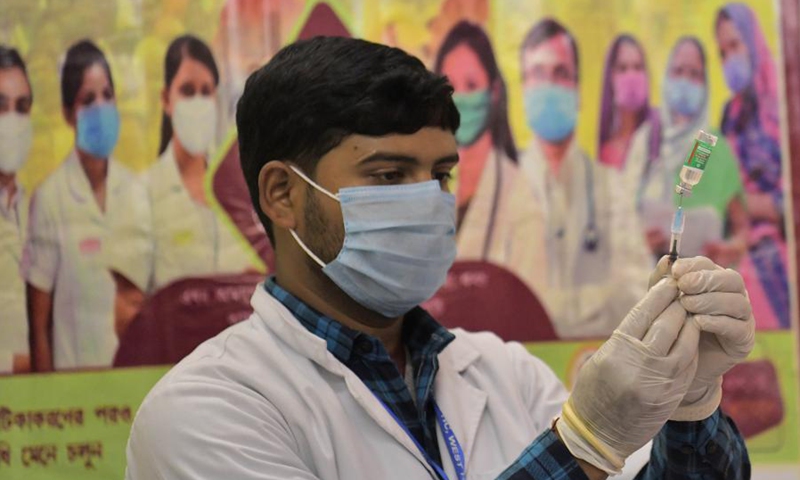India's capacity to produce high-quality vaccines questioned after fire

A health worker prepares a dose of the COVID-19 vaccine Covishield for health workers of the Border Security Force at Agartala, the capital city of India's northeastern state of Tripura, Jan. 21, 2021.Photo:Xinhua
Observers and netizens questioned India's capacity to manufacture and produce high-quality vaccines after a fire ravaged a plant at India’s biggest vaccine maker and caused five deaths on Thursday.
Pictures and videos circulating online showed the blaze, but Indian media reports and the company itself, the Serum Institute of India (SII), said the accident would not affect the production of COVID-19 vaccines.
There will be no impact on vaccine production as the company has other facilities “kept in reserve to deal with such contingencies,” Adar Poonawalla, the firm’s CEO, tweeted on Thursday night.
But some netizens questioned how such a fire could not affect stockpile plans.
“The fire was likely caused by some electronic fault, which would affect the company’s functioning. This is a basic supply chain problem,” an Indian Twitter user said.
“They [the Indian media] are reporting what the company said and are very clear that's what they're doing. Should they only report what the company's official statement is?” said another.
Murlidhar Mohol, mayor of Pune city in southern Maharashtra state where the SII plant is located, said that the extent of the damage was not immediately clear, AP reported, noting that dozens of company workers in lab suits were leaving the compound as firefighters worked to extinguish the blaze.
Analysts said that as the accident occurred at India’s largest vaccine manufacturer, it may affect people’s confidence in high-quality vaccine production.
Fires are not uncommon at factories in India, and are mainly caused by electricity faults, Tian Guangqiang, an assistant research fellow with the National Institute of International Strategy at the Chinese Academy of Social Sciences, told the Global Times on Friday.
Also, many companies do not have the capacity to produce qualified vaccines, and they cannot increase capacity quickly, Tian said, adding that the coverage from the Indian media is mainly intended to stabilize the situation and ease fears.
India started one of the world’s toughest inoculation projects on Saturday, aiming to vaccinate 300 million people by July with the SII-produced Covishield and Covaxin, made by another local firm, Bharat Biotech. The country has also offered its vaccines to nearby countries, including Bhutan and the Maldives, followed by three million doses offered to Nepal and Bangladesh, Aljazeera reported.
Some Indian people have expressed dissatisfaction about India’s “vaccine diplomacy,” saying India should distribute vaccines to Indians first.
It's clear that India's vaccine production is not enough to match its ambition, Tian said. “Vaccination of 300 million people by July needs 600 million doses, which means that India needs to produce at least 100 million doses per month, without counting exportation.”
SII is producing more than 50 million doses a month according to the BBC, and it also plans to supply 200 million doses to Covax, a WHO-backed effort to procure and distribute inoculations to poorer countries, Aljazeera said.
India’s vaccines are mainly supplied to South Asian countries, as a form of aid. Not many countries actually purchased Indian vaccines due to quality concerns, Tian said.
The All India Drug Action Network, a patients' rights group, said the approval of SII-produced Covishield has been rushed as the manufacturer has not completed a "bridging study" for the vaccine. The company has said it will try to conduct the bridging trial of the vaccine in India in February, according to the BBC.

